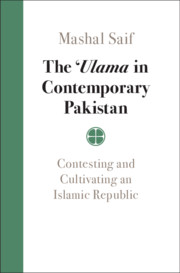Book contents
- The ‘Ulama in Contemporary Pakistan
- The ‘Ulama in Contemporary Pakistan
- Copyright page
- Dedication
- Contents
- Acknowledgments
- Note on Translation and Transliteration
- Introduction
- 1 The Clerics and the Council
- 2 Sovereignty between God and the State
- 3 Questioning State Identity and Legitimacy
- 4 Seeking Security
- 5 Minority Aspirations and the State
- Conclusion
- Bibliography
- Index
4 - Seeking Security
Shi‘a ‘Ulama and State Formation
Published online by Cambridge University Press: 20 October 2020
- The ‘Ulama in Contemporary Pakistan
- The ‘Ulama in Contemporary Pakistan
- Copyright page
- Dedication
- Contents
- Acknowledgments
- Note on Translation and Transliteration
- Introduction
- 1 The Clerics and the Council
- 2 Sovereignty between God and the State
- 3 Questioning State Identity and Legitimacy
- 4 Seeking Security
- 5 Minority Aspirations and the State
- Conclusion
- Bibliography
- Index
Summary
This chapter offers a theoretical analysis of Shi‘a ‘ulama’s conceptions of and engagements with their state in the midst of sectarian violence. My close study of Shi‘a religious journals and fieldwork among the ‘ulama highlights that many clerics view the state as culpable for Shi‘a deaths, not simply despite the state’s claim to an Islamic identity, but in some instances, because of Pakistan’s Sunni Islamic leanings. The chapter then interrogates why the very ‘ulama who critique the state for its complicity in Shi‘a deaths also appeal to the state for protection. By way of answer, I argue that when viewing the state as a configuration of institutions whose negative effects they experience, the ‘ulama rebuke the state for its complicity in anti-Shi‘a violence. However, when viewing the state as an idea, fantasy or image, the ‘ulama understand it as a legitimate authoritative body transcending society and providing security. Drawing on philosophical and anthropological works on the state, I explain that the ‘ulama’s appeals for protection help constitute the state by reproducing the effect of the state idea or fantasy through discourses and bodily practices. I argue that the approach to the state adopted by this chapter can be fruitfully applied to study state–‘ulama relations across the Muslim world.
- Type
- Chapter
- Information
- The 'Ulama in Contemporary PakistanContesting and Cultivating an Islamic Republic, pp. 186 - 235Publisher: Cambridge University PressPrint publication year: 2020

